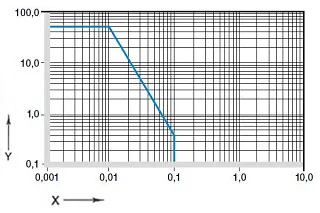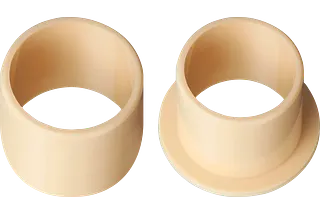Change Language :
iglidur® K - Material data
The most important specifications at a glance
iglidur® K is characterised by its good wear characteristics at low moisture absorption and good thermal and mechanical specifications. This supports a very universal application spectrum.
| Descriptive technical specifications | ||
|---|---|---|
| Wear resistance at +23°C | - 🟧 🟧 🟧 ⬜️ ⬜️ + | More information on wear resistance |
| Wear resistance at +90°C | - 🟧 🟧 🟧 ⬜️ ⬜️ + | |
| Wear resistance at +150°C | - 🟧 🟧 ⬜️ ⬜️ ⬜️ + | |
| Slide property | - 🟧 🟧 🟧 🟧 ⬜️ + | Coefficient of friction, dynamic, against steel: 0.06 - 0.21µ |
| Wear resistance under water | - 🟧 🟧 ⬜️ ⬜️ ⬜️ + | |
| Media resistance | - 🟧 🟧 🟧 ⬜️ ⬜️ + | More information on media resistance |
| Resistant to edge pressures | - 🟧 🟧 🟧 ⬜️ ⬜️ + | |
| Resistant to shock and impact loads | - 🟧 🟧 🟧 ⬜️ ⬜️ + | |
| Dirt resistance | - 🟧 🟧 🟧 🟧 ⬜️ + |
Temperatures
The temperatures prevailing in the bearing system also have an influence on bearing wear. Wear increases with rising temperatures, and the effect is particularly noticeable from a temperature of +100°C upwards. Additional protection is required at temperatures higher than +70°C.
| min. application temperature | Upper application temperature, long-term | Upper application temperature, short-term | In addition secure axially from |
|---|---|---|---|
| -40°C | +170°C | +240°C | +70°C |
Permissible surface speeds
iglidur K has been developed for low to medium surface speeds. The maximum values specified in the table can only be achieved with low pressure loads. At the given speeds, friction can cause a temperature increase to maximum permissible levels. In practice, though, this level is rarely reached due to the interactions of varying conditions.
Sliding speeds of different iglidur materials
Information on the pv value and lubrication
| Maximum surface speeds [m/s] | Rotating | Oscillating | linear |
|---|---|---|---|
| Permanent | 1.0 | 0.7 | 3.0 |
| Short-term | 2.0 | 1.4 | 4.0 |
Permissible pv values

Diagram 01: Permitted pv values for iglidur K plain bearings with 1mm wall thickness in dry operation against a steel shaft, at +20°C, installed in a steel housing
X = surface speed [m/s]
Y = pressure [MPa]
pv value, max. (dry):
0.3 [MPa·m/s]
Mechanical properties
The compressive strength of iglidur K plain bearings decreases with increasing temperatures. Diagram 02 illustrates this relationship. The maximum recommended surface pressure represents a mechanical material parameter. Conclusions about the tribology cannot be drawn from this. Diagram 03 shows the elastic deformation of iglidur K under radial loads. Under the maximum recommended surface pressure of 50MPa, the deformation is less than 3%. Possible plastic deformation depends, among other things, on the duty cycle of the load.
Friction and wear
Like the wear resistance, the coefficient of friction μ also changes with the load (diagram 04 and 05).
Coefficients of friction for iglidur K against steel (Ra = 1μm, 50HRC):
| iglidur K | dry | Greases | Oil | Water |
|---|---|---|---|---|
| Coefficient of friction µ | 0.06 - 0.21 | 0.09 | 0.04 | 0.04 |
Shaft materials
Friction and wear are also dependent, to a large degree, on the mating partner. Shafts that are too smooth increase both the coefficient of friction and the wear of the bearing. For iglidur K, a ground surface with an average surface finish Ra = 0.15-0.2µm is recommended. Diagram 06 shows results of testing different shaft materials with plain bearings made from iglidur K. It is important to note that with increasing loads, the recommended hardness of the shaft increases. The "soft" shafts tend to wear more easily and thus increase the wear of the overall system, if the loads exceed 2MPa. The comparison of rotation and pivoting shows that the wear is almost identical at a pressure up to 5MPa. The higher the loads, the greater the difference (diagram 07).
Installation tolerances
iglidur K plain bearings are standard bearings for shafts with h-tolerance (recommended minimum h9). The bearings are designed for press-fit into a housing machined to a H7 tolerance. After being assembled into a nominal size housing, the inner diameter automatically adjusts to the E10 tolerances. In relation to the installation tolerance, the inner diameter changes with the absorption of humidity.
Important tolerances according to ISO 354-7 after press-fitting:
| Diameter d1 [mm] | Shaft h9 [mm] | iglidur K E10 [mm] | Housing H7 [mm] |
|---|---|---|---|
| up to 3 | 0 - 0.025 | +0.014 +0.054 | 0 +0.010 |
| > 3 up to 6 | 0 - 0.030 | +0.020 +0.068 | 0 +0.012 |
| > 6 up to 10 | 0 - 0.036 | +0.025 +0.083 | 0 +0.015 |
| > 10 up to 18 | 0 - 0.043 | +0.032 +0.102 | 0 +0.018 |
| > 18 up to 30 | 0 - 0.052 | +0.040 +0.124 | 0 +0.021 |
| > 30 up to 50 | 0 - 0.062 | +0.050 +0.150 | 0 +0.025 |
| >50 to 80 | 0 - 0.074 | +0.060 +0.180 | 0 +0.030 |
| >80 to 120 | 0 - 0.087 | +0.072 +0.212 | 0 +0.035 |
| > 120 up to 180 | 0 - 0.100 | +0.085 +0.245 | 0 +0.040 |
Moisture absorption
Chemical resistance
iglidur K plain bearings are resistant to diluted alkalis and very weak acids as well as fuels and all types of lubricants. The low moisture absorption also allows use in wet or damp environments.
All data at room temperature [+20 °C], + resistant 0 conditionally resistant - non-resistant
| Medium | Resistance |
|---|---|
| Alcohols | + up to 0 |
| Greases, oils without additives | + |
| Hydrocarbons | + |
| Fuels | + |
| Strong alkalines | 0 |
| Diluted alkalines | + |
| Strong acids | - |
| Diluted acids | 0 to - |

Buy iglidur K products in the online shop
- Large selection of moulds and materials
- Available within 24 hours
- No minimum order value
- No minimum order quantity
Typical application areas
Consulting
I look forward to answering your questions

Shipping and consultation
In person
Monday to Friday: 8 am – 8 pm
Saturday: 8 am – 12 pm
Chat-Service
Monday to Friday: 8 am – 5 pm
WhatsApp-Service
Monday to Friday: 8 am – 5 pm










